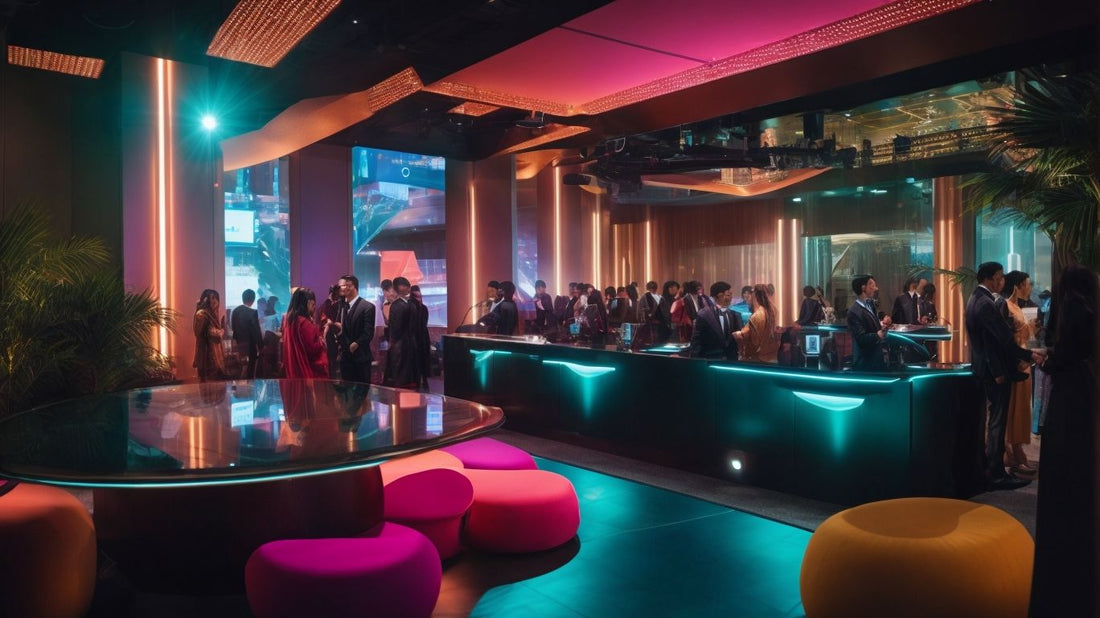
7 Exciting Corporate Event Trends to Enhance Your Business Gatherings
Share
.jpg)
Corporate events have evolved significantly in recent years, adapting to changing dynamics and incorporating innovative trends. It is essential for businesses to stay updated with these trends to create impactful and engaging events. Some key trends in corporate events include:
1. Rise of Virtual and Hybrid Events: With advancements in technology, virtual and hybrid events have gained popularity. These formats offer flexibility and accessibility, allowing participants to attend from anywhere in the world. They provide interactive features and networking opportunities through virtual platforms.
2. Emphasis on Sustainability and Eco-Friendly Practices: Companies are increasingly prioritizing environmental responsibility in their events. Sustainable practices, such as reduced waste, eco-friendly materials, and carbon-neutral initiatives, are being incorporated to minimize the environmental impact.
3. Integration of Technology: Technology plays a crucial role in enhancing event experiences. Features like mobile event apps, live polling, and interactive presentations are being used to promote attendee engagement and streamline event logistics.
4. Personalization and Customization: Personalizing corporate events to meet the individual preferences of attendees is gaining prominence. Customized agendas, personalized messages, and tailored experiences create a more meaningful and memorable event for participants.
In addition to these changing dynamics, innovative formats and themes are being adopted to make corporate events more engaging:
1. Interactive Workshops and Team Building Activities: Hands-on workshops and team-building activities foster collaboration, creativity, and enhance the overall event experience for participants.
2. Immersive Experiences and Themed Environments: Creating immersive environments that align with event themes helps to captivate attendees' attention and create a unique atmosphere.
3. Unconventional Venues and Destination Events: Choosing unconventional venues and organizing destination events add an element of excitement and novelty to corporate gatherings, leaving a lasting impression on participants.
Event technology is also advancing, and key trends in this area include:
1. AI and Machine Learning for Event Planning: Artificial Intelligence (AI) and machine learning algorithms assist in event planning, attendee matchmaking, and data analysis, enabling organizers to deliver more personalized and data-driven events.
2. Augmented Reality and Virtual Reality: These technologies offer immersive experiences, allowing attendees to visualize products or environments virtually and engage with virtual content.
3. Live Streaming and Video Conferencing: Live streaming and video conferencing enable remote participants to join corporate events, improving accessibility and expanding the reach of the event.
Networking and engagement are crucial aspects of any corporate event:
1. Networking Opportunities and Relationship Building: Facilitating networking sessions and structured activities provides opportunities for participants to connect, network, and build meaningful relationships.
2. Gamification and Interactive Elements: Incorporating gamification elements and interactive activities enhances attendee engagement, making the event more enjoyable and memorable.
3. Social Media Integration and User-generated Content: Integrating social media platforms and encouraging user-generated content amplifies the event's reach and fosters online engagement before, during, and after the event.
Finally, health and safety considerations have gained utmost importance in the wake of the global pandemic:
1. Health Screenings and Safety Protocols: Implementing health screenings, safety protocols, and hygiene practices ensure the well-being of attendees and create a safe event environment.
2. Hybrid Event Options for Remote Attendance: Offering hybrid event options allows for remote attendance, catering to participants who cannot physically be present while maintaining engagement and interaction.
3. Crowd Management and Physical Distancing: Strategically managing event flow, implementing physical distancing measures, and crowd control techniques help maintain a safe and comfortable event atmosphere.
By staying updated with these trends and incorporating them into corporate events, businesses can create impactful and memorable experiences for their attendees while adapting to the changing landscape of event planning.
Changing Dynamics of Corporate Events
Discover the ever-evolving landscape of corporate events as we delve into the changing dynamics of these gatherings. From the rise of virtual and hybrid events to an increased emphasis on sustainability and eco-friendly practices, we'll explore how companies are adapting to meet the demands of the modern world. Prepare to delve into the fascinating integration of technology and the growing trend of personalization and customization in corporate events. Get ready to uncover the future of corporate gatherings with these intriguing sub-sections.Rise of Virtual and Hybrid Events
The rise of virtual and hybrid events has completely transformed the landscape of corporate gatherings. Here are some key aspects to consider:
- Accessibility: With the rise of virtual and hybrid events, there is now an opportunity for wider participation, completely eliminating geographical barriers.
- Flexibility: One of the major advantages of virtual and hybrid events is that attendees can now join from any location, which in turn reduces travel costs and time constraints.
- Interactivity: To enhance attendee engagement, it is crucial to incorporate engaging features like live Q&A sessions and virtual networking opportunities.
- Customization: Virtual platforms present organizers with a range of options to offer personalized content and tailored experiences for the attendees.
- Data and analytics: With digital events, organizers can gather valuable data insights, enabling them to measure engagement and make informed decisions.
Emphasis on Sustainability and Eco-Friendly Practices
To maintain pace with the ever-changing corporate event landscape, it is of utmost importance to place emphasis on sustainability and eco-friendly practices. This can be accomplished by implementing the following strategies:
- Choose eco-friendly venues that have adopted sustainable practices, such as utilizing renewable energy sources or minimizing waste generation.
- Encourage attendees to carpool or use public transportation to decrease carbon emissions associated with travel.
- Introduce recycling and composting programs during the event to reduce the amount of waste sent to landfills.
- Utilize sustainable materials for event signage, promotional materials, and giveaways. This includes using recycled paper or opting for digital alternatives.
- Serve locally sourced and organic food and beverages to support local businesses and decrease the carbon footprint related to product transportation.
By giving prominence to sustainability and eco-friendly practices, corporate events can not only lessen their environmental impact but also inspire attendees to adopt more sustainable habits in their own lives.
Integration of Technology
The incorporation of technology has completely transformed corporate events, revolutionizing engagement and enhancing the experience for attendees. There are various ways in which technology is integrated into corporate events:
- AI and Machine Learning: By utilizing AI and machine learning, event planning becomes streamlined, efficiency is improved, and data analysis is enhanced.
- Augmented Reality and Virtual Reality: The inclusion of AR and VR technology creates immersive experiences, allowing virtual participants to fully engage in the event.
- Live Streaming and Video Conferencing: The use of live streaming and video conferencing enables remote attendees to connect to the event in real-time, expanding the event's reach and accessibility.
To further strengthen the integration of technology, event organizers can consider implementing personalized event apps, interactive digital signage, and wearable technology. These additions contribute to creating a seamless and tech-savvy event experience.
Personalization and Customization
Personalization and customization are crucial trends in the world of corporate events. Here are some ways to naturally incorporate these concepts into your event planning:
Design event invitations and materials in a personalized manner to make attendees feel special.
Provide different options for the agenda or breakout sessions to cater to various interests and learning preferences.
Give personalized swag bags or gifts that are tailored to each attendee's preferences or job role.
Curate interactive experiences that allow attendees to personalize their event experience, such as selecting activities or participating in hands-on workshops.
Offer customization choices for meals and dietary restrictions to ensure inclusivity and accommodation for everyone.
At a recent corporate event, the organizing team exceeded expectations in personalizing the experience for attendees. They proactively inquired about participants' hobbies and interests beforehand and integrated those elements into the event. One attendee, who had a passion for photography, was pleasantly surprised with a tailored photography workshop during the event. This considerate gesture not only made the attendee feel valued, but also crafted a truly memorable experience for them.
Innovative Formats and Themes for Corporate Events
Looking for fresh and exciting ideas to spice up your corporate events? Look no further! In this section, we'll dive into the world of innovative formats and themes that are taking the corporate event industry by storm. From interactive workshops and team building activities that ignite collaboration to immersive experiences and themed environments that transport participants to new realms, we've got it all covered. Not to mention, we'll explore how unconventional venues and destination events can truly elevate your event game. Get ready to revolutionize your corporate events like never before!Interactive Workshops and Team Building Activities
Interactive workshops and team building activities are crucial elements of corporate events, as they play a vital role in fostering collaboration, communication, and camaraderie among employees. Here is a comprehensive list of popular options for such activities:
These interactive workshops and team building activities create a positive and engaging environment, which fosters strong employee relationships and significantly boosts overall morale.
Immersive Experiences and Themed Environments
Immersive experiences and themed environments are gaining popularity in the realm of corporate events. These innovative formats provide a unique and memorable atmosphere for attendees. When planning immersive experiences and themed environments, it is important to consider several key elements:- Interactive set design: Design visually striking sets that transport attendees to a different world, enhancing their immersion.
- Themed décor: Pay attention to every detail, from table settings to lighting, to ensure a cohesive and immersive theme throughout the event.
- Engaging activities: Incorporate interactive activities that actively involve attendees and make them a vital part of the immersive experience.
- Thematic entertainment: Book performers and entertainers who align with the theme and have the ability to captivate the audience.
- Creative branding: Implement themed branding elements throughout the event to strengthen the immersive experience and establish a unified visual identity.
Unconventional Venues and Destination Events
In the world of corporate events, Unconventional Venues and Destination Events are gaining popularity. Companies are moving away from traditional conference centers and opting for unique locations to add excitement and create memorable experiences for attendees. Unconventional venues, such as museums, art galleries, rooftop spaces, or even historic landmarks, are now in high demand. Destination events take participants to exotic locations, offering a chance to combine work and leisure in one unforgettable experience. These events allow for immersive experiences and a break from the usual office environment, fostering creativity and collaboration among attendees. Embracing Unconventional Venues and Destination Events can elevate the overall experience and make corporate events more engaging and memorable.
Key Trends in Event Technology
Events are evolving, and technology is at the forefront of this transformation. In this section, we dive into the captivating world of event technology and explore key trends that are reshaping corporate gatherings. Get ready to discover how AI and machine learning are revolutionizing event planning, how augmented reality and virtual reality are creating immersive experiences, and how live streaming and video conferencing are connecting attendees from around the globe. Step into the future of corporate events as we delve into the exciting realm of event technology.AI and Machine Learning for Event Planning
Using AI and machine learning for event planning can significantly enhance efficiency and deliver a seamless experience. Here are several ways in which AI and machine learning are revolutionizing event planning:
- Automated scheduling and logistics optimization, eliminating manual tasks and reducing human error.
- Attendee profiling and personalized recommendations, ensuring targeted marketing and enhanced engagement.
- Real-time data analysis and predictive analytics, allowing organizers to make well-informed decisions and optimize event success.
- Facial recognition and sentiment analysis for better crowd management and security.
- Chatbots and virtual assistants for instant customer support and personalized communication.
Augmented Reality and Virtual Reality
Augmented reality and virtual reality (AR/VR) are emerging trends in the corporate event industry. They offer immersive and interactive experiences that enhance attendee engagement and create memorable events. AR/VR technology allows participants to explore virtual environments, interact with digital content, and visualize products or concepts. For example, companies can use AR/VR to showcase their products in a virtual trade show or create interactive training sessions. These technologies also provide opportunities for remote attendance, allowing individuals from anywhere in the world to participate in the event virtually. AR/VR undoubtedly adds a futuristic and innovative element to corporate events, boosting attendee engagement and creating unique experiences.
Live Streaming and Video Conferencing
Live streaming and video conferencing have become essential components of corporate events, providing opportunities for remote participation and global reach.
- Reach a wider audience: Live streaming and video conferencing allow businesses to reach more individuals beyond the physical event space.
- Cost-effective: Live streaming and video conferencing eliminate the need for travel expenses, venue rentals, and accommodation, making events more budget-friendly.
- Interactive experiences: Virtual events with live streaming and video conferencing can offer interactive features like Q&A sessions, polls, and real-time chat, enhancing engagement.
- Reduced carbon footprint: By minimizing travel, live streaming and video conferencing contribute to eco-friendly practices.
Pro-tip: Ensure a smooth experience by testing the technology beforehand and providing clear instructions to participants.
Importance of Networking and Engagement
In today's corporate events, networking and engagement play a vital role in creating meaningful connections and fostering business growth. Discover how networking opportunities and relationship building, along with innovative gamification elements, interactive features, and seamless social media integration, are transforming the way interactions take place. Get ready to explore the power of these strategies in enhancing attendee engagement and generating user-generated content that leaves a lasting impact. So, let's dive in and unlock the secrets of successful corporate event networking and engagement.Networking Opportunities and Relationship Building
Networking opportunities and relationship building are crucial elements of corporate events. They play a significant role in facilitating connections, collaborations, and potential business prospects. Here are several approaches to enhance networking and relationship building at corporate events:
| - Structured Networking Sessions: | Incorporate dedicated time slots for participants to network with one another in a structured manner, such as speed networking or round-robin sessions. |
| - Interactive Activities: | Organize team-building activities, icebreakers, or group discussions to encourage active interaction and foster acquaintanceship among participants. |
| - Mentorship Programs: | Arrange mentorship programs that allow seasoned professionals to offer guidance and share insights with young professionals or newcomers. |
| - Social Media Integration: | Encourage attendees to connect and engage with each other on social media platforms, thereby expanding networking possibilities beyond the event itself. |
By implementing these strategies, a conducive environment for networking can be created, facilitating the development of valuable relationships that can potentially lead to future collaborations and business opportunities.
Gamification and Interactive Elements
Incorporating gamification and interactive elements into corporate events can significantly enhance attendee engagement and create memorable experiences. There are several effective ways to include these elements:
|
Pro-tip: To maximize engagement, consider offering rewards or incentives to participants who actively engage in the gamified elements of the event.
Social Media Integration and User-generated Content
Social media integration and user-generated content are essential factors in the success of corporate events. Here are some important considerations:
- Enhanced reach: By incorporating social media platforms into corporate events, companies can expand their audience and engage with a larger number of people.
- Real-time updates: Social media enables attendees to receive immediate updates on event schedules, sessions, and speakers, keeping everyone well-informed and engaged.
- User-generated content: Encouraging attendees to share their experiences and thoughts through user-generated content fosters a sense of community and generates excitement surrounding the event.
- Interactive engagement: Social media offers opportunities for interactive engagement, including live polls, Q&A sessions, and contests, allowing attendees to actively participate and contribute.
- Post-event discussions: Social media platforms facilitate discussions after the event, enabling attendees to continue engaging with the content and networking with other participants.
Addressing Health and Safety in Corporate Events
With health and safety taking center stage in corporate events, this section dives into the crucial aspects of addressing these concerns. Discover the importance of health screenings and safety protocols, explore innovative hybrid event options for remote attendance, and learn effective crowd management techniques, including maintaining physical distancing. From prioritizing attendee well-being to adapting to the new normal, we uncover the essential strategies for creating safe and successful corporate events. Get ready to navigate the changing landscape of event planning with confidence!Health Screenings and Safety Protocols
When it comes to corporate events, ensuring the well-being of attendees is paramount, and therefore health screenings and safety protocols are essential. To achieve this, there are several steps that should be taken:
- Implement health screenings and temperature checks upon arrival to identify any potential health risks.
- Require all attendees to complete health questionnaires or participate in self-screening assessments to assess their well-being.
- Place hand sanitizing stations strategically throughout the venue to promote good hygiene practices.
- Make it mandatory for all attendees to wear masks and maintain physical distancing to minimize the risk of transmission.
- Regularly disinfect high-touch areas such as door handles, tabletops, and other frequently touched surfaces.
Pro-tip: It is crucial to communicate these safety measures to attendees in advance. This will not only reassure them but also help create a sense of trust and security during the event.
Hybrid Event Options for Remote Attendance
- Hybrid events allow for both in-person and remote attendance, providing flexibility and accessibility.
- Attendees can participate virtually through live streaming, video conferences, or interactive platforms.
- Remote attendees can engage in real-time discussions, ask questions, and interact with speakers and other participants.
- Hybrid events offer a cost-effective solution, eliminating travel and accommodation expenses for remote attendees.
- Organizers can reach a larger audience by offering remote attendance options, increasing event visibility and impact.
Sarah, a marketing professional, was excited to attend a prestigious industry conference. Due to a last-minute work commitment, she couldn't travel to the event. Fortunately, the conference offered hybrid event options for remote attendance. Sarah was able to join the sessions virtually, ask questions during Q&A sessions, and network with other professionals through online platforms. The hybrid event option allowed Sarah to participate and benefit from the conference, even from the comfort of her office.
Crowd Management and Physical Distancing
Managing crowds and ensuring physical distancing are crucial factors in organizing corporate events, especially in the current pandemic era. Here are some strategies to achieve effective crowd management and physical distancing:
- Implement clear signage and floor markers to guide attendees and encourage them to maintain safe distances for crowd management and physical distancing.
- Set up designated entrance and exit points to control the flow of people and avoid congestion in order to manage the crowd and maintain physical distancing.
- Provide hand sanitizer stations throughout the venue to promote good hygiene practices and ensure physical distancing.
- Arrange seating in a way that allows for appropriate spacing between attendees to ensure crowd management and physical distancing.
- Consider using technology solutions like event registration and ticketing platforms to manage crowd capacity and monitor attendee numbers, thus helping with crowd management and physical distancing.
By implementing these measures, event organizers can ensure the safety and well-being of attendees while still delivering a successful and engaging corporate event.
Frequently Asked Questions
What are the current trends in the corporate events industry for 2023?
The current trends in the corporate events industry for 2023 include the resurgence of in-person events with a digital twist, the importance of digital engagement on a single platform, a growing focus on sustainability and diversity, the use of mobile event apps to enhance attendee experiences, and the integration of digital elements into in-person events.
How has the digitization of events impacted attendee engagement?
The digitization of events has enhanced attendee engagement by providing live updates, personalized schedules, interactive sessions, networking opportunities, and real-time feedback through mobile event apps. It has allowed for more personalized attendee experiences and extended engagement beyond the event dates.
What challenges are organizations facing in the events industry?
Organizations in the events industry are facing challenges such as rising inflation and staffing shortages, which have presented difficulties in event planning and execution. Additionally, rising event costs require organizations to increase their event spending and focus on cost savings and efficiencies.
How can organizations prove the return on investment (ROI) of their events?
Organizations can prove the ROI of their events by demonstrating the impact and business value of the events. This can be achieved through data analysis, measuring key performance indicators, and showcasing how the events have contributed to lead generation, customer relationships, and overall business growth.
What is the importance of venue sourcing in the corporate events industry?
Venue sourcing is crucial in the corporate events industry due to the competition for quality event space. Early planning and sourcing suitable venues are important to secure the desired event location and meet the needs of attendees. Venue costs and availability can significantly impact the success of an event.
How are virtual events being used to engage online audiences?
Virtual events serve as the connective tissue between in-person experiences and provide opportunities for brands to engage with online audiences through repurposed event content. Virtual events allow for interactive sessions, networking opportunities, and the sharing of compelling content, particularly video, which is preferred by audiences who consume video content on-demand.






